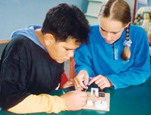![]() STUDENTS’
PERCEPTIONS OF TECHNOLOGY EDUCATION
STUDENTS’
PERCEPTIONS OF TECHNOLOGY EDUCATION
![]() Liz
Eley
Liz
Eley
In
1993 technology education was introduced to the New Zealand National
Curriculum as a learning area in its own right. New Zealand students’
perceptions about technology have been described in previous research
as both limited and limiting in the sense that a poor appreciation
of the nature of technology results in limited understanding that
in turn curtails technological practice. This study investigated
this consideration further by focusing on conceptions of and attitudes
towards technology (both in and out of school) held by students
who participated in the 1996 NEMP assessment. |
Approximately
460 Year 4 and Year 8 students completed a questionnaire in interviews
conducted by NEMP teacher-administrators. The teachers read the open-ended
questions (see next section) to the students and, if requested, recorded
the responses. Students were encouraged to give as full an answer as possible
and asked to clarify answers that were not clear. Responses were examined
for differences between year levels and, for each year level, for differences
according to gender and ethnicity (students identified on their school
roll as Mäori, and those identified as non-Mäori).
| What
do students think technology is? • Seven percent of Year 8 and 43% of Year 4 students said they did not know what technology was. Of those who did give a definition: – few gave responses that referred to a purposeful activity to meet societal needs; – many defined technology in terms of equipment, with a fifth of the sample referring to making and designing objects; – boys’ definitions were more comprehensive than those of girls, and non-Mäori students’ definitions were more comprehensive than those of their Mäori counterparts. What do students think they do at school for technology? • Just over 20% of Year 4 and 4% of Year 8 students reported they did no technology at school. • About a third of the students said they built or designed things in technology, with a further 36% of Year 8 students referring to workshop subjects. • Over 40% of the students referred to using computers. |
How
much do students enjoy technology at school? • Most students gave a positive rating. • Boys retained a high enjoyment of school technology between Years 4 and 8, but girls became less positive. • Only 5% of students ranked technology as their favourite subject at school; 20% listed it as one of their three favourite subjects. What technology activities do students do out of school? • Thirty-nine percent of students referred to construction activities and 27% to using computers. • Boys and non-Mäori students reported a wider range and higher frequency of technology activities for leisure. • At both year levels, boys were twice as likely as girls to mention construction activities. At Year 8, girls were six times as likely as boys to refer to cooking or sewing. |
![]()
Narrow
conceptions of technology have three implications for teaching: students’
lack of understanding can impair their learning; students’ expectations
for school technology may not be met by a curriculum that is based on
different conceptions from theirs; and poor achievement in technology
has been linked to poor conceptions of technology. To develop a broad
conception of technology, students need opportunities to explore and articulate
their understandings of this subject. Given that a high proportion of
younger students did not identify the experiences they receive at school
as technology, explicit identification of this subject in the class timetable
could have a positive influence on students’ perceptions of it.
